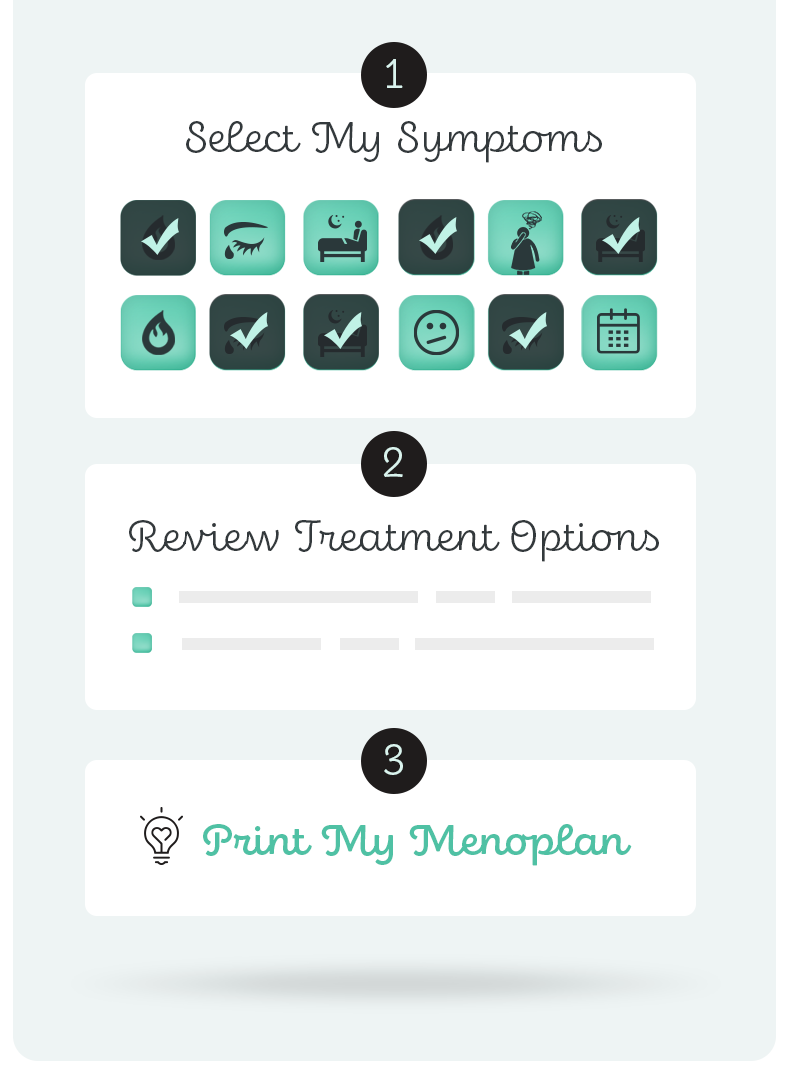Treatments
cognitive behavioral therapy, psychotherapy, and counseling
WHAT IS IT?
Cognitive behavioral therapy (CBT) is a type of psychotherapy to help you create healthy coping mechanisms and build positive lifestyle habits related to your thinking, feelings and behaviors. CBT helps you become aware of inaccurate or negative thinking so you can view challenging situations more clearly and respond to them in a more effective way. CBT uses practical self-help strategies. These are designed to immediately improve your quality of life. CBT can be an effective way to treat various menopausal symptoms including hot flashes and night sweats, sleep problems, mood changes, depression, anxiety, and sexual concerns.
CBT is offered in group or individual sessions, on the phone, online, and through paid apps. CBT therapy for mood via virtual therapy sessions using an avatar is available in some clinics. Regardless of the mechanism of delivery, the number of sessions varies based on the individual needs and the symptoms being treated.
Working with a therapist (live or virtual) will likely be more successful than using a CBT app. People are more likely to follow the whole program if they have to report to a therapist.
OUR BOTTOM LINE: DOES IT HELP?
YES. There is strong evidence that cognitive behavioral therapy helps with anxiety, depression and other emotional challenges. And, unlike medications, it has no risks.

HOT FLASHES AND NIGHT SWEATS
Cognitive behavioral therapy has been shown to reduce the degree to which hot flashes and night sweats are rated as a problem. CBT does not change the frequency of hot flashes, but can change the frequency of bothersome hot flashes and life interference from hot flashes.
Group CBT interventions have involved psychoeducation (physiology of VMS; how thoughts and emotions affect the perception of physical sensations), training in relaxation and paced breathing, and cognitive and behavioral strategies to manage VMS (identifying and challenging negative beliefs about VMS; monitoring and modifying triggers of VMS; relaxation exercises).
Self-guided CBT content mimics that of the group CBT and includes a self-help book completed during a 4-week period, two contacts with a clinical psychologist, weekly homework, and a compact disc for daily practice of relaxation and paced breathing.
CBT for hot flashes and night sweats has also been delivered by trained nurses or psychologists, in person as a group or one on one, via the internet, or an app.

MOOD, ANXIETY & DEPRESSION
CBT has long been used to help with depressive or anxiety symptoms. With CBT for mood, the therapist or counselor helps a person become aware of ways they think that may be negative, inaccurate, or harmful. The person learns to question these thoughts, understand them, and change these unhelpful ways of thinking. CBT helps a person think about, and react differently, to situations. Research shows that it is helpful for both anxiety and depression.
A cognitive behavioral therapist may have you keep a diary, practice mindful meditation, do role plays, identify cognitive distortions (how you think), do controlled exposure to anxiety, reintroduce rewarding activities, and other techniques to help you change (restructure) your thoughts and find new ways to react to problematic situations. It can be done individually, in groups of people with similar difficulties, or through the internet. There is often “homework”, or assignments to do between sessions. It is a problem-oriented approach to helping people cope with their lives. It is sometimes done for a specific number of sessions.
Many other types of talk therapy and counseling can be helpful for treating depression and anxiety. These therapies can support individuals as they experience life challenges. While the many other different types of therapy and counseling have not been studied specifically in midlife women, there is extensive experience delivering these treatments to women of all ages.

SLEEP
Cognitive behavioral therapy for insomnia (CBTI) is for sleep problems. CBTI can help you identify thoughts and behaviors that are causing sleep problems and replace them with better habits. CBTI helps you figure out if your sleep environment is good. It covers strategies for stress reduction and relaxation. Your therapist will have you keep a sleep diary, to check your habits and schedule. CBTI also involves a stretch of nights with less sleep, to reset your body’s rhythms. CBT-I can be delivered by an app, but the sleep deprivation portion of the therapy is very important and can be hard to stick to without a therapist.

SEXUAL CONCERNS: LOW SEX DRIVE and PAIN DURING SEX
CBT for Sexual Concerns in the Perimenopause (CBT-SC-Peri) is a weekly, four session treatment, lasting up to 90 min per session and includes psychoeducation and cognitive and behavioral strategies designed to challenge unhelpful beliefs and promote healthy sexual behaviors. As this is an individual CBT protocol, content will be tailored to address the specific problems relevant for each participant.
CBT for sexual concerns is delivered by a trained psychologist or sex therapist, one on one.
POTENTIAL RISKS & SIDE EFFECTS
There are no risks for CBT.
QUALITY OF LIFE EXPECTATIONS
By helping with hot flashes, sleep, anxiety, depression or sexual concerns CBT may improve your quality of life.
IF I WANT TO TRY THIS TREATMENT WHAT ARE MY NEXT STEPS?
Look online for CBT therapists in your area. Some geographic areas or insurance providers publish a directory of providers. You can look for a certified menopause psychologist and a psychologist specializing in mood and female sexual function on The Menopause Society website [https://menopause.org/], and a certified sleep specialist on the sleep center on the American Academy of Sleep Medicine website. Check to see what is covered by your insurance.
If you are having difficulty with sleep, a first step is to make sure that your “sleep hygiene” (sleep environment) is good. Here are suggestions from the American Association of Sleep Medicine:
- Keep a regular sleep schedule. Get up at the same time every day, even on weekends or during vacations.
- Set a bedtime that is early enough for you to get at least 7 hours of sleep.
- Don’t go to bed unless you are sleepy.
- If you don’t fall asleep after 20 minutes, get out of bed.
- Establish a relaxing bedtime routine.
- Use your bed only for sleep and sex.
- Make your bedroom quiet and relaxing. Keep the room at a comfortable, cool temperature.
- Limit exposure to bright light in the evenings.
- Turn off electronic devices at least 30 minutes before bedtime.
- Don’t eat a large meal before bedtime. If you are hungry at night, eat a light, healthy snack.
- Exercise regularly and maintain a healthy diet.
- Avoid consuming caffeine in the late afternoon or evening.
- Avoid consuming alcohol before bedtime.
- Reduce your fluid intake before bedtime.
(Source: http://sleepeducation.org/essentials-in-sleep/healthy-sleep-habits)
- You may want to use this insomnia screening tool to help you decide if you need to talk with a doctor or therapist about sleep problems.
- You can use this National Sleep Foundation Sleep Diary to track your sleep and see what helps you sleep and what can be improved
- You can use a diary to track your hot flashes
You can use this sexual function screening tool [ xxxxx] to help you decide if you need to talk with a doctor or therapist about problems with sexual function.
Carpenter JK, Andrews LA, Witcraft SM, Powers MB, Smits JAJ, Hofmann SG. Cognitive behavioral therapy for anxiety and related disorders: A meta-analysis of randomized placebo-controlled trials. Depress Anxiety. 2018 Jun;35(6):502-514. doi: 10.1002/da.22728. Epub 2018 Feb 16. PMID: 29451967; PMCID: PMC5992015.
Hall J, Kellett S, Berrios R, Bains MK, Scott S. Efficacy of Cognitive Behavioral Therapy for Generalized Anxiety Disorder in Older Adults: Systematic Review, Meta-Analysis, and Meta-Regression. Am J Geriatr Psychiatry. 2016 Nov;24(11):1063-1073. doi: 10.1016/j.jagp.2016.06.006. Epub 2016 Jun 17. PMID: 27687212.
Ijaz S, Davies P, Williams CJ, Kessler D, Lewis G, Wiles N. Psychological therapies for treatment-resistant depression in adults. Cochrane Database Syst Rev. 2018 May 14;5(5):CD010558. doi: 10.1002/14651858.CD010558.pub2. PMID: 29761488; PMCID: PMC6494651.Webb CA,
López-López JA, Davies SR, Caldwell DM, Churchill R, Peters TJ, Tallon D, Dawson S, Wu Q, Li J, Taylor A, Lewis G, Kessler DS, Wiles N, Welton NJ. The process and delivery of CBT for depression in adults: a systematic review and network meta-analysis. Psychol Med. 2019 Sep;49(12):1937-1947. doi: 10.1017/S003329171900120X. Epub 2019 Jun 10. PMID: 31179960; PMCID: PMC6712954.
Rosso IM, Rauch SL. Internet-Based Cognitive-Behavioral Therapy for Depression: Current Progress and Future Directions. Harv Rev Psychiatry. 2017 May/Jun;25(3):114-122. doi: 10.1097/HRP.0000000000000139. PMID: 28475503; PMCID: PMC5421393.
Zhang A, Borhneimer LA, Weaver A, Franklin C, Hai AH, Guz S, Shen L. Cognitive behavioral therapy for primary care depression and anxiety: a secondary meta-analytic review using robust variance estimation in meta-regression. J Behav Med. 2019 Dec;42(6):1117-1141. doi: 10.1007/s10865-019-00046-z. Epub 2019 Apr 19. Erratum in: J Behav Med. 2020 Apr;43(2):339. PMID: 31004323.
https://www.nimh.nih.gov/health/topics/psychotherapies/
https://www.apa.org/ptsd-guideline/patients-and-families/cognitive-behavioral
https://www.mayoclinic.org/tests-procedures/cognitive-behavioral-therapy/about/pac-20384610
Last reviewed July, 2021



